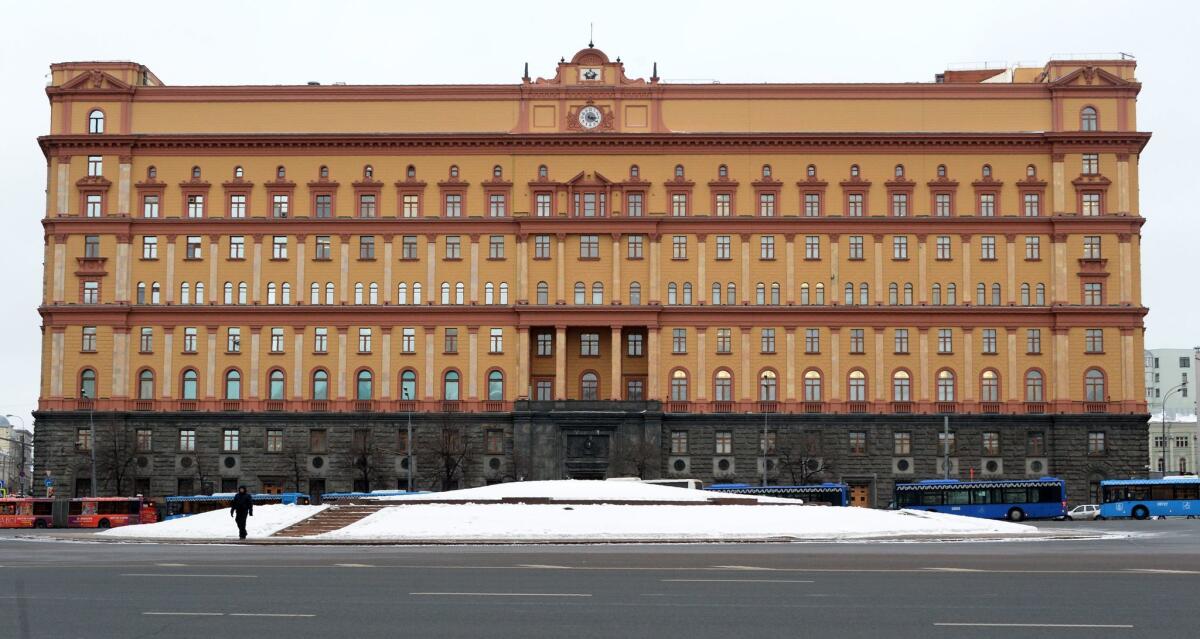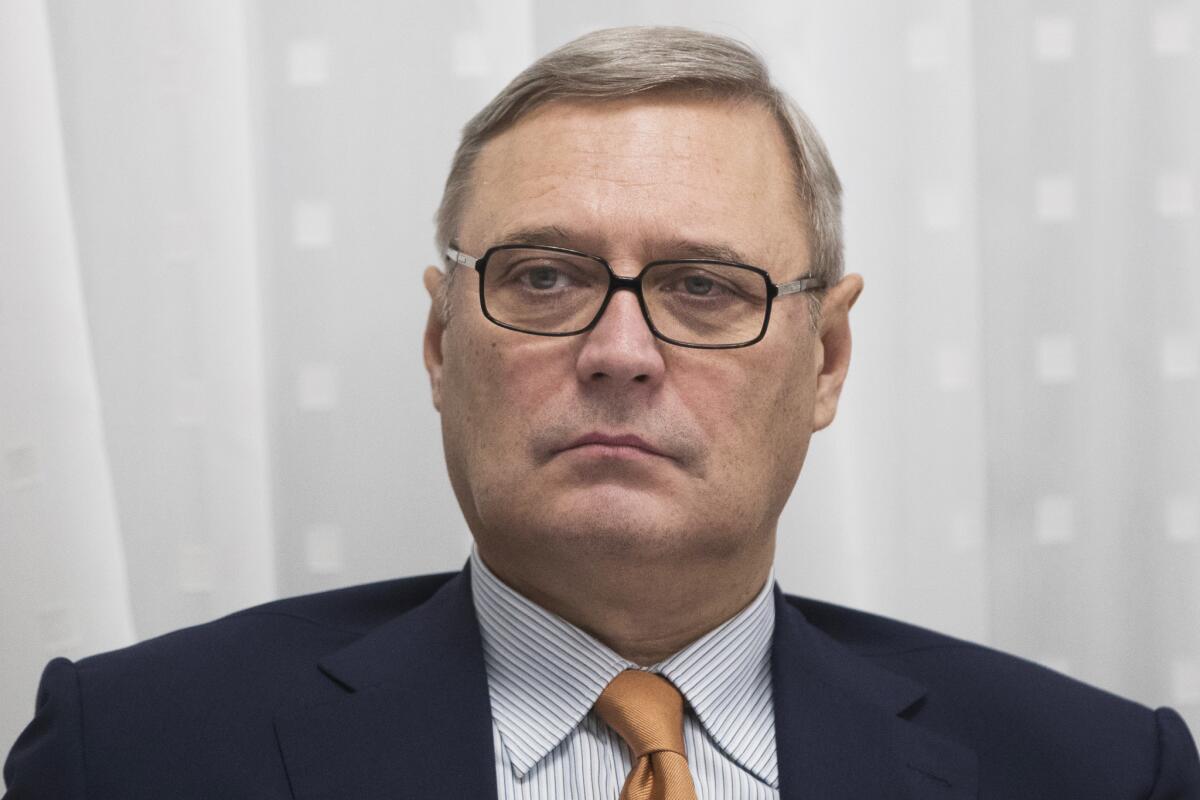Who, us? Kremlin says it doesn’t engage in ‘kompromat,’ but history suggests otherwise
- Share via
It’s a Russian word suddenly known to many Americans — kompromat.
A mashup of the Russian-language terms for “compromising” and “materials,” this pithy figure of speech encompasses a whole range of spycraft — entrapment, surreptitious videos, blackmail — that might seem more at home in a Cold War spy novel than as a serious news topic as a U.S. presidential inauguration draws near.
For the record:
11:40 p.m. Aug. 23, 2019An earlier version of this article mentioned the disclosure of the existence of a dossier — unverified by U.S. intelligence — reportedly assembled by Russia on President-elect Donald Trump. The dossier was purportedly compiled by a former British intelligence official. An earlier version also referred to the wrong year for the collapse of the Soviet Union. It was 1991, not 1989.
Kompromat is a dark art dating back decades, from the spy-versus-spy days of the old Soviet Union to Vladimir Putin’s newly resurgent Russia. The targets — at least those who are known — have included foreign diplomats, politicians, business figures and dissidents of all stripes.
Kompromat “has been a staple feature of Russia’s politics since at least the early 1990s,” said Daniel Treisman, a professor of political science at UCLA, whose work focuses on Russian politics and economics and comparative political economy. “These days, most of the embarrassing materials are generated by Russia’s security services, which leak secretly recorded videos or tapes to media sources.”

The aim, according to analysts and historians: to discredit and control.
“It’s basically making use of anything that a person wouldn’t want to have found out about themselves — you can release it if they don’t behave the way you want them to behave,” said Olga Oliker of the Washington-based Center for Strategic and International Studies.
The kompromat phenomenon burst into messy view late Tuesday with the disclosure of the existence of a dossier — unverified by U.S. intelligence — purportedly compiled by a former British intelligence official on President-elect Donald Trump.
Trump forcefully denied any impropriety and blasted reports about the dossier as “fake news” put together by “sick people.”
Putin’s government, unsurprisingly, vehemently denied that any such activity goes on — ever.
“The Kremlin does not collect compromising materials,” Putin spokesman Dmitry Peskov told journalists.
History suggests otherwise.
In 1999, Russia’s prosecutor-general,Yuri Skuratov, launched an investigation into corruption in the administration of then-President Boris Yeltsin. After parliament rebuffed Yeltsin’s attempt to fire Skuratov, a grainy video surfaced on state television of a man, identified as the prosecutor, cavorting with two prostitutes. Skuratov was initially suspended but later got the ax, just as he claimed to be moving in on high-level corruption.

Former Russian Prime Minister Mikhail Kasyanov attends an annual meeting of opposition and human rights activists in Moscow on Dec. 12, 2016.
More recently, Mikhail Kasyanov, a former Putin crony, got a taste of kompromat. According to media reports, Kasyanov was being flagged as a possible competitor to Putin in next year’s presidential election. But in the spring of 2016, video was broadcast on a state-controlled, pro-Putin television channel that purported to show Kasyanov and a female opposition activist having sex and speaking contemptuously about other opposition figures.
The Russian online tabloid Life News regularly publishes sensational and scandalous reports. Treisman said the publication is believed to have sources within Russia’s Federal Security Service, or FSB, the successor agency to the KGB.
In its classic form, as with Skuratov and Kasyanov, kompromat often takes the form of embarrassing information of a sexual nature — sometimes the result of entrapment.
To this day, foreign diplomats are warned to beware of “honey traps” — enticement to perform intimate acts, often in hotel rooms, that are then surreptitiously recorded on video.
“It’s a long-standing spy technique that was widely used during Soviet times so there is a certain degree of skill and tradition, but it’s not a technique that is exclusive to the Russians,” said Chris Chivvis, associate director of the International Security and Defense Policy Center and a senior political scientist at Rand Corp.
And such information is often collected solely on “spec” — compiled but never used, kept on hand just in case.
“It could be financial, sexual indiscretion, but it could be other things as well … things that seem unpatriotic,” Chivvis said.
It can involve corruption, or finances, or a broad range of personal behavior, he said.
While it’s probably best known in connection with the Soviet Union, which collapsed in 1991, kompromat also had a heyday in the post-Soviet era — with a powerful boost from technology, analysts said.
“It’s different now than during the days of the Soviet Union, both in the way it’s released and the way it’s used,” said Oliker, who is a senior advisor and director of CSIS’ Russia and Eurasia program.
After the breakup of the Soviet Union, she and others said, there were huge amounts of information that had been amassed by Kremlin-accountable spy agencies using a formidable system of domestic surveillance.
“Old KGB records came out, and people who were building businesses and running for office could be compromised,” Oliker said.
Sometimes blackmail or public shaming is involved. A spouse might be told of an affair, for example, or discrediting information could be posted on the Internet so it would be the first thing a Google search turned up.
“It’s still very commonplace for Westerners visiting Russia to get phone calls to offer ‘companionship,’” said Oliker. And sometimes, she said, the would-be entrapment comes from private organizations other than the government.
What appears in apparent kompromat operations is often as murky as it is salacious. In 2009, a senior British diplomat in the Russian city of Ekaterinburg abruptly stepped down and left Russia after a video appeared online purporting to show him cavorting with a pair of prostitutes. At the time, the British Foreign Office said little other than to confirm his resignation.
Some cases of suspected kompromat can involve little more than a verbal indiscretion. In 2014, American diplomat Victoria Nuland, a senior Europe envoy in the Obama administration, was secretly recorded using an expletive directed at the European Union, while talking on the phone with the U.S. ambassador to Ukraine. A recording of the intercepted call was then gleefully tweeted out by an aide to Russia’s deputy prime minister.
Using proprietary information against one’s enemies, of course, is not an invention of Putin, or even of his former employer, the KGB.
“My guess is that it’s older than Russia,” said Oliker. “It’s as old as states and statehood, I think, as a tool used by human beings. But if you’re talking about a society where you have a tremendous amount of surveillance in general, you’re particularly well set.”
Special correspondent Mansur Mirovalev in Moscow contributed to this report.
ALSO
Kremlin says purported dossier on Trump is just ‘pulp fiction’
Trump alleges leaks by U.S. spy agencies, something ‘Nazi Germany would have done’
Russia begins to draw down its forces in Syria
More to Read
Sign up for Essential California
The most important California stories and recommendations in your inbox every morning.
You may occasionally receive promotional content from the Los Angeles Times.











